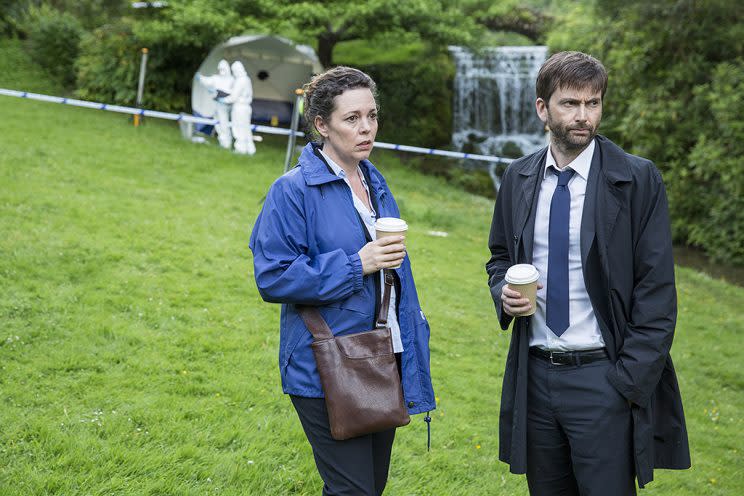‘Broadchurch’ Final Season: David Tennant Previews Hardy and Miller’s Slight Role Reversal

“I know that there’s been an impatience from some of our American friends,” David Tennant says, explaining why he too is happy that our wait for the third season of Broadchurch is finally over. Two months after the British import finished its eight-week run in the U.K., the final season premieres on BBC America this Wednesday.
The story picks up three years after the events of the Season 2 finale, with Detective Investigator Alec Hardy (Tennant) again working side by side with Detective Sgt. Ellie Miller (Olivia Colman) as a new case rocks the seaside community. As we learn right away, a local woman named Trish Winterman (Happy Valley‘s Julie Hesmondhalgh) has been raped and is unable to identify her attacker.
“To get to come back and tell one final story was an honor, really,” Tennant says. “And to be telling a story like this, which is about a very difficult subject, and a subject that is often mistreated by television drama, and to do it in a way that [Broadchurch creator/writer] Chris Chibnall approached it, with real dignity and clarity of purpose and a delicacy that I think treats the subject and, indeed, the victims of these terrible crimes with a dignity and a clear-sightedness — yes, it’s a real privilege to be part of that.
“And it’s a show that people wanted to see,” he adds. “What a treat to be part of something that there’s an appetite for, and that people are waiting for. It’s a responsibility — you’ve got to get it right. But it’s lovely to be in the midst of something that is so enjoyed. … You make stories to connect with people, and that’s clearly what Broadchurch has managed to do.”
It’ll also be clear from the get-go that Chibnall, who had the counsel of Dorset’s Sexual Assault Referral Centre and Dorset Rape Crisis throughout his writing process, wanted to show “best practices” for how women should be treated when they come forward and evidence is collected. “You want to show people that there are these systems in place, and that victims are believed,” Tennant says. “That victims are looked after. And although it’s awful perhaps to have to relive some of those events, that it’s worth doing because there is something that can be done and that it’s not something to be ashamed of.
“As an actor, of course, you take pains to get that right,” Tennant notes. “We talked to officers. We talked to sexual assault workers. We didn’t want to treat it like play; we wanted to make sure we were giving it the attention and the truthfulness that that subject deserved. We’re, of course, set on our way by Chris, who spent months and months researching every aspect of the world of what happens to a sexual assault victim — what support is given and what support is lacking. I think he did that beautifully. He told that story with a real levelheadedness and clear-eyedness, which was wonderful to then retell.”
That doesn’t mean that the investigation runs smoothly, however. As is hinted at in the promo for the season, Hardy and Miller have slightly different approaches when it comes to obtaining Trish’s full, official statement about the night she was assaulted. Hardy pushes for her to do it ASAP, because he feels a responsibility to find the rapist before another woman is attacked; Miller would prefer to let Trish decide when she’s ready.
“Dramatically, you want the two characters to behave in slightly different ways, but I think the research we did indicated that that’s often the case,” Tennant says. “Obviously, this is not across the board, but there’s lots of evidence that male officers often find themselves struggling with their own guilt for their own gender, a disgust in their own maleness, whereas female officers are often a bit more clearheaded about it, a bit more methodical, a bit easier to look past the emotion — which was interesting and hadn’t really occurred to me, but I suppose makes sense when you start thinking about it.
“What it came to is that so many of the people that work in that field have such compassion, such delicacy, and that was something that we wanted to reflect. I think both Hardy and Miller have that, although they come at it from slightly different angles. But then those characters have always done that in the show up to this point. They’ve had a very different approach to policing, and Hardy has always felt the one in control and Miller’s been a slightly more emotional one. Those roles slightly reverse here. Hardy feels a little more helpless, a little more infuriated. He says, ‘I can understand a murder, but this. I just don’t get it.’ He can’t get his mind into the mind of a perpetrator, and that infuriates him in itself.”
The final season of Broadchurch premieres June 28 at 10 p.m. on BBC America.

